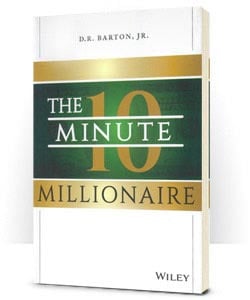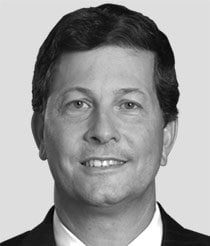I taught my first live trading seminar in October of 2000. That was a full 15 years after I began to trade.
As longtime readers already know, I take a very methodical approach to the markets.
And after personally training thousands of people and working with top traders all over the globe, I've discovered that what people should do when trading and investing and what they actually do are often two very different things.
I received my MBA degree when modern economics theory was still based on the assumption that people make decisions so that they will get the biggest reward. (That's called the "theory of expected-utility maximization," for those of you who had the name on the tip of your tongue, but just couldn't quite remember it...)
In fact, you couldn't get an economic paper published "back in the day" if it didn't have utility maximization and efficient markets as foundational beliefs.
Thank goodness both of those theories have holes in them big enough to drive a bus through...
That's because our 10-Minute Millionaire strategies depend on people acting irrationally from time to time. When people get crazy (act irrationally), markets or stocks get driven to extremes. And it's at those extremes where the fastest and biggest profits are found.
Of course, there's a catch. In order to corral those profits, we have to remain completely rational at all times. Identifying crazy behavior in the markets - and avoiding it ourselves - is one of our foundational (and hardest) tasks as traders. But it is oh, so rewarding.
Here's how to do it...
A Nobel Prize Winner Shows You How to Sidestep Emotional Biases
One Nobel Prize-winning work changed the academic world to think a bit more like a trader when behavioral finance finally established psychology and mindset as important aspects in finance and economics.
Daniel Kahneman, the 2002 Nobel Prize winner in economic science, proved that people act irrationally in the markets, exploding the old academic "myths" of how markets work.
Kahneman and his co-author Amos Tversky put it right there in black and white: People don't make decisions based on probability and statistics. They make them based on emotions and past experiences. (As an interesting note: Amos Tversky passed away six years before the award was granted, and Nobel Prizes are not awarded posthumously. So only Kahneman received the award for their co-authored paper on prospect theory.)
In short, Kahneman and Tversky proved that decision making for most people radically changes when they are faced with the combination of losing money and uncertain results.
This potent combination changes people from logical, math-based decision makers to emotional experience-based decision makers. Using emotionally charged shortcuts or so-called "rule of thumb" guidelines makes us pretty lousy at deciding things.
But if I'm being honest, I'd have to guess anyone who has traded or invested in markets knows what this Nobel Laureate was writing about.
Fast Money: This powerful secret made one man a millionaire. Now he's sharing it live on camera - find out how you could use it to become $2,918 richer in less than minute. Click here...
Traders and investors love making profits. But for some reason, they hate losses even more and will go to great lengths to avoid them. Traders rationalize, "It's not a loss until I close out the position." So they hang onto little losing positions and let them turn into big losses. And traders love having a winning trade, so they tend to take them very quickly instead of giving a winning position the time to turn into an even bigger winner. These are the same findings that Dr. Kahneman wrote about in his ground-breaking article.
One of the key principles here at the 10-Minute Millionaire is that we use these emotional decisions that drive the market to extremes to find great trade entries. And we avoid falling into emotional traps (or biases) ourselves by first, recognizing they exist, and second, having tools to combat them.
All successful traders and investors have learned to overcome or at least mitigate these biases.
And it's the proper mindset that sets the successful trader apart. There are successful traders in all time frames and instruments and using many different strategies. But they all use similar thought processes in handling risk and uncertainty.
It is this huge need to understand and counteract our natural profit-stealing biases that has compelled me to share some key learnings on "The Millionaire Mindset" today and in upcoming articles and videos.
Remember I told you I was working on an exciting new project over the past few weeks? Well, that project is close to being finished, and "The Millionaire Mindset" is a big part of it. We're going to be learning how to tap into this mindset to set up income streams in a really unique way. I've been working hard on this for quite some time, and I'm pretty sure you'll be blown away by it...
I have to visit the studio a few more times to finalize some recordings, but I'll have all the details ready for you in just a short while.
Today, let's look at how you can avoid the decision-making mistakes that made a Nobel Prize winner famous.
[mmpazkzone name="in-story" network="9794" site="307044" id="137008" type="4"]
Think Like a Trader, Not Like an Emotional Mess
The Noble prize winner from 2002 identified three distinct decision-making problems. This week we'll look at the psychology behind these problems and how you can avoid them in your trading. In a future article we'll look at some hard numbers that will give concrete examples of how you can apply these simple concepts to your trading and investing.
- Adopt an Attitude of Indifference to Losses: Consider losses a business expense. Better yet, frame your losses as the necessary "raw materials" for your business. Framing losses this ways has several clear benefits. You understand that losses are a required part of trading. You want to minimize the cost of raw materials, not avoid them! (If you never bought any raw materials, you could never make any products.)
- Accept Uncertainty as a Part of Trading: The 2002 Nobel winner found that people pay too much to avoid uncertainty. There are many areas in life where people accept uncertainty: relationships are almost always uncertain, so are fishing trips and cheering for the Detroit Lions. In any of these endeavors, we don't know how they will end. It's the same with our trading. Accept that any single trade could be a win or a loss. Get out if you're wrong, and hang on if you're right. Over a large number of trades, good traders and good trading strategies will win. But for one trade, anything can happen. So don't get emotionally attached to a trade. Execute your plan and move on to the next opportunity.
- Understand the Law of Small Numbers: Traders, like golfers, seem to be eternal optimists. A golfer can take 100 bad swings and still be excited to go out and play tomorrow because of one good shot. In a similar way, traders often draw broad conclusions from a ridiculously small number of data points. I wish I had a buck for every time I've heard, "That system (or newsletter or strategy) stinks - it lost three times in a row!" Then the optimist thought process kicks in: "There has to be something better out there!" Realize that it is impossible to draw a meaningful conclusion from a small number of data points. Three, four, or even ten occurrences are not enough to draw a conclusion in the trading world (or in any complex environment). Spend the time to understand why your trading or investing strategy works, and don't throw it away after a few losses. In terms of statistics, 30 trials is usually a minimum number that is needed to make any meaningful decisions for something as simple as a coin toss. For more complex systems (like the stock market), even more trials are required to draw meaningful conclusions.
As a trader or investor, keep your emotions in check and understand what mindset biases you're prone to give in to. Let your knowledge of your system guide your decision making, and you'll be on your way to beating a Nobel-sized problem that plagues traders both new and old.
Learn How to Claim Your FREE Book Below

The 10-Minute Millionaire can show you how you can amass $1 million or more.
The best part is, you only have to "work" in practically effortless, 10-minute increments once a week!
Click here to learn how to claim your free copy. You can scroll through this message and read at your own pace.
The post The Most Important "Think" in Your Millionaire Journey appeared first on 10 Minute Millionaire.
About the Author
D.R. Barton, Jr., Technical Trading Specialist for Money Map Press, is a world-renowned authority on technical trading with 25 years of experience. He spent the first part of his career as a chemical engineer with DuPont. During this time, he researched and developed the trading secrets that led to his first successful research service. Thanks to the wealth he was able to create for himself and his followers, D.R. retired early to pursue his passion for investing and showing fellow investors how to build toward financial freedom.



